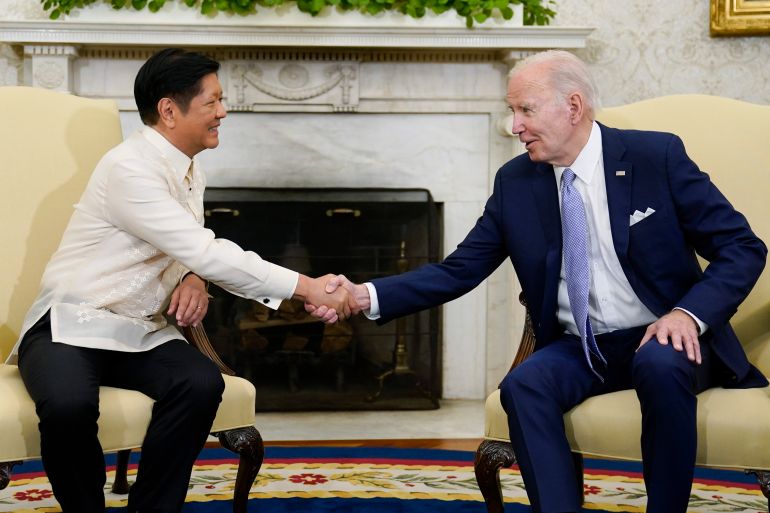‘Ironclad’: Biden, Marcos Jr affirm US-Philippines security ties
Two leaders agree to deepen military relationship amid heightened tensions in Asia Pacific, China pressure.

United States President Joe Biden has assured his Philippines counterpart Ferdinand Marcos Jr that the US commitment to the defence of its Southeast Asian ally remains “ironclad,” including in the disputed South China Sea.
Marcos, on the first White House visit by a Philippines leader in 10 years, stressed it was “only natural” for Manila to be close to its sole treaty ally in a region with “arguably the most complicated geopolitical situation in the world right now.”
Keep reading
list of 3 itemsPhilippines reports ‘confrontation’ with China in South China Sea
S Korea, US discussing joint nuclear exercises, says Yoon
The talks in Washington, DC, on Monday afternoon took place with the two countries moving closer together after ties soured under Marcos Jr’s predecessor Rodrigo Duterte.
The trip also coincides with a push by the Biden administration to counter China’s growing influence in the Asia-Pacific region, and its increasingly assertive claim to almost the entire South China Sea.
Speaking from the Oval Office, Biden noted that Marcos Jr had previously visited the White House with his father, Ferdinand Marcos Sr, who declared Martial Law in the Philippines and was ousted from office in the 1986 ‘People Power’ revolution.
“Welcome back to the White House. We were talking on the way over, it’s been a while since you’ve been here,” Biden said at the top of the meeting, pledging that the US will continue to support the “modernisation” of the Philippines military.
In a joint statement released following the meeting, the duo hailed “the historic momentum in US-Philippine relations, and resolve to continue expanding engagement and cooperation on all issues of common concern”.
China-US competition
A senior US official, who spoke to reporters on background before the meeting, had described the talks as the first of their kind “at this level and intensity between the United States and the Philippines in decades”.
Marcos Jr has sought to balance his country’s relationships with the US and China, as both superpowers vie for influence in the Asia-Pacific region. That’s a departure from Duterte, who was widely seen as prioritising relations with Beijing.
China remains the Philippines’ top trading partner and Marcos Jr visited Beijing in January. However, Beijing’s increasingly assertive claim to almost the entire South China Sea has caused increased concern in Manila.
Still, Marcos Jr signalled as he left for Washington, DC that he was wary of being caught between the superpowers, telling reporters: “We will not allow the Philippines to be used as a staging post for any kind of military action.”
Washington, meanwhile, has seen the Philippines as key to any effort to counter an invasion of Taiwan by China, which claims the island as its own territory.
Biden is also heading to Japan this month for a Group of Seven (G7) meeting and to Australia for a Quad summit with leaders of Japan, India and Australia — two meetings that are expected to focus heavily on China.
Speaking to reporters ahead of Monday’s meeting with Marcos Jr, a Biden administration official said recent signalling from China may push the Philippines closer to the US.
The official referenced a reported comment last month by Beijing’s ambassador to Manila that the Philippines should not support Taiwan’s independence “if you care about the 150,000 overseas foreign workers” of Filipino origin who live there, which some viewed as a “veiled threat”.
“Some of the steps that China have taken have concerned [Marcos Jr], probably even surprised him,” the senior Biden administration official said. “He has strong desire to work closely with both countries but finds himself in a situation that the steps that China’s taking are deeply concerning.”
Military bases
For its part, Manila recently agreed to allow Washington access to four more of its military bases under the so-called Enhanced Defense Cooperation Agreement. The two allies also carried out their largest-ever military manoeuvres last month.
Under the latest agreement to be finalised during Marcos Jr’s visit, the Biden administration will transfer three C-130 aircraft and look to send additional patrol vessels to the Philippines, the White House said.
The US and the Philippines will also adopt defence guidelines that will “institutionalise key bilateral priorities, mechanisms, and processes to deepen alliance cooperation and interoperability across land, sea, air, space, and cyberspace,” the White House said in a statement.
Biden also reaffirmed the 1951 Mutual Defense Treaty, “underscoring that an armed attack on Philippine armed forces, public vessels, or aircraft in the Pacific”, the leaders said in their joint statement.
Biden and Marcos Jr also also discussed economic cooperation, including sending a trade and investment mission to Manila; supporting the rollout of 5G telecommunications technology, and launching public-private financing for critical minerals and “smart” power grid development, the White House said.
The Philippines president’s visit comes as he still faces a US court judgement connected with $2bn of plundered wealth during his father’s rule. As head of state, the younger Marcos is immune from US prosecution.
A former US colony, the Philippines maintained close ties with Washington even after full independence in 1946.
Relations deepened after Marcos Sr became president in 1965, and continued even as the leader was accused of widespread human rights abuses and consolidating power, including declaring martial law in 1972, suspending parliament, arresting political opponents, and taking control of the courts.
His tenure was marked by widespread corruption and alleged theft from the government, and Washington helped the elder Marcos flee into exile to Hawaii during the 1986 uprising.